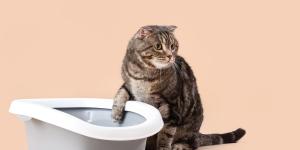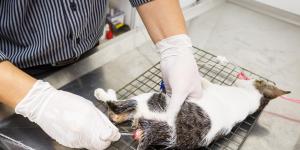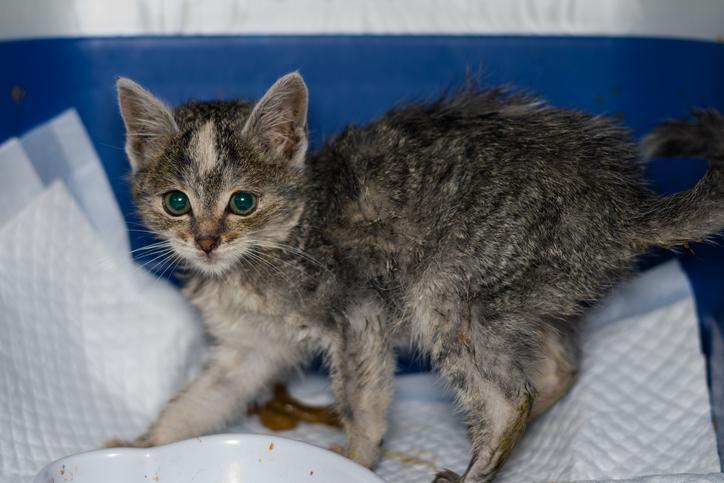Feline Inflammatory Bowel Disease - Treating IBD in Cats



See files for Cats
Inflammatory bowel disease (often shortened to IBD), is a term for a range of diseases resulting in inflammation of the intestine. The cells which cause the mucosa of the intestine to become inflamed include lymphocytes, plasma cells or eosinophils. Feline inflammatory bowel disease can sometimes be accompanied by inflammation of the pancreas or liver, something known as triaditis in cats. The clinical signs are those which generally accompany gastrointestinal disease, although vomiting and weight loss frequently occur. Chronic diarrhea is not as common. A proper differential diagnosis must be carried out, especially as symptoms can imple a range of diseases.
At AnimalWised, we look at the causes and symptoms of feline inflammatory bowel disease. We also see what options there are for treating IBD in cats.
Causes of feline inflammatory bowel disease
Inflammatory Bowel Disease (IBD) in cats is a chronic inflammatory disease of the small intestine. It is an umbrella term for a range of diseases which cause bowel inflammation of which the cause is relatively unknown. It can sometimes involve the large intestine or stomach. It can also be associated with pancreatitis and/or cholangitis, in which case it is referred to as feline triaditis.
In feline inflammatory bowel disease there is an infiltration of inflammatory cells (lymphocytes, plasma cells or eosinophils) in the lamina propria of the mucous layer of the intestine. This can can reach deeper layers. Although the origin is unknown, there are three hypotheses about the causes of IBD in cats:
- Autoimmune alteration against the intestinal epithelium itself.
- Response to bacterial, parasitic or dietary antigens from the gut lumen.
- Failure in the permeability of the intestinal mucosa that causes a greater exposure to these antigens.
Does breed or age affect inflammatory bowel disease in cats?
There is no specific age which is makes a cat predisposed to inflammatory bowel disease. Although it is generally seen more in middle-aged cats, younger and older cats can also be affected. However, there appears to be a certain predisposition in some breeds, including the Siamese, Persian and Himalayan breeds.
Symptoms of feline inflammatory bowel disease
When inflammation occurs in the intestine, the clinical signs are very similar to those of intestinal lymphoma. Although this is usually more frequent in older cats, it is not exclusive to them. The main symptoms of inflammatory bowel disease in cats are:
- Anorexia or loss of appetite
- Weight loss
- Mucous or bilious vomiting
- Small intestine diarrhea
- Large intestine diarrhea
If the large intestine is affected, it is possible the cat will present with blood in their feces. If an abdominal palpation is performed, we may notice an increased hardness in the loops of intestines or an enlargement of mesenteric lymph nodes.
Diagnosis of feline inflammatory bowel disease
A definitive diagnosis of IDB in cats can be found by integrating the animal's medical history (anamnesis), physical examination, laboratory analysis, diagnostic imaging tests and histopathology of biopsies. A blood and biochemistry test, T4 detection, urinalysis, and abdominal X-ray should be performed to rule out systemic diseases such as hyperthyroidism, kidney disease or liver disease .
Occasionally, blood tests for cats with chronic inflammation can show increased neutrophils, monocytes, and globulins. If low vitamin B12 appears, it may indicate that the problem is in the final part of the small intestine (ileum). Abdominal radiography can detect foreign bodies, gas or paralytic ileus.
However, abdominal ultrasound is the most useful imaging test for IBD in cats. It is able to detect a thickening of the intestinal wall, specifically the mucosa, and even measure it. It is not frequent in this disease to see the structure of the intestinal layers become lost as can occur in the intestinal tumor (lymphoma). You may see an increase in mesenteric lymph nodes and, depending on their size and shape, know if they are inflamed or if it is tumor.
The definitive diagnosis and the differential with lymphoma will be obtained with the histopathological analysis of the samples obtained by endoscopic biopsy or laparotomy. In more than 70% of cases, the inflammatory cells are lymphocytic/plasmacytic, although it can also be caused by eosinophilic with less response to treatment. Other much less possible infiltrates are neutrophilic (neutrophils) or granulomatous (macrophages).

Treatment for feline inflammatory bowel disease
The treatment of IBD in cats is based on a combination of diet and immunomodulators. If any comorbidities exist, they will need to be treated also.
Dietary treatment
Many cats with IBD improve when given a hypoallergenic diet within a few days. This is because it decreases the substrate for bacteria to grow, increases intestinal absorption and reduces the potential for osmosis. Although the change to these diets can normalize intestinal flora, it is difficult to reduce the pathogenic species that overpopulate the intestine. In addition, if there is concomitant pancreatitis, antibiotics should be administered to avoid infections in the bile duct or intestine due to the anatomical characteristics of the cat (feline triaditis).
If the large intestine is also affected, the use of fiber-rich diets may be prescribed. In any case, it will be the veterinarian who decides on the best food for cats with feline inflamatory bowel disease, depending on each particular case.
Medical treatment
If a low amount of vitamin B12 is demonstrated, it should be supplemented at a dose of 250 micrograms subcutaneously once a week for 6 weeks. Afterwards, it will be reduced to every 2 weeks for another 6 weeks and then monthly.
Metronidazole for cats is effective because it is antimicrobial and immunomodulatory, but it must be used correctly to avoid adverse effects on intestinal cells and neurotoxicity. Corticosteroidssuch as prednisolone are used at immunosuppressive doses. This therapy should be carried out in cats with marked weight loss and digestive issues, even if the diet change has not been made to observe if there is food hypersensitivity.
Prednisolone therapy can be started with 2 mg/kg/24h orally. If improvement is seen, the dose is maintained for 2-4 more weeks. If the clinical signs are subsiding, the dose is lowered to 1 mg/kg/24h. The dose must be reduced until reaching the minimum effective that allows control of the symptoms.
If corticosteroids are not enough, other immunosuppressants should be introduced, such as:
- Chlorambucil at a dose of 2 mg/cat orally every 48 hours (cats over 4 kg) or 72 hours (cats less than 4 kg). Complete blood counts should be performed every 2-4 weeks in case of bone marrow depression.
- Ciclosporin at a dose of 5 mg/kg/24 hours.
Treatment of mild inflammatory bowel disease in cats includes:
- Hypoallergenic diet for 7 days and evaluate the response.
- Metronidazole for 10 days at a dose of 15 mg/kg/24 hours orally. Reduce the dose by 25% every 2 weeks until its withdrawal.
- If they do not respond to the above, prednisolone should be started at 2 mg/kg/24h alone or in combination with metronidazole, reducing the dose by 25% every 2 weeks until the minimum effective dose is achieved.
This article is purely informative. AnimalWised does not have the authority to prescribe any veterinary treatment or create a diagnosis. We invite you to take your pet to the veterinarian if they are suffering from any condition or pain.
If you want to read similar articles to Feline Inflammatory Bowel Disease - Treating IBD in Cats, we recommend you visit our Intestinal problems category.
- GataWeb. Inflammatory bowel disease in the cat. Available at: http://www.gataweb.com/verarticulos.php?id=253
- Ferguson, D., & Gaschen, F. (2009). Feline idiopathic inflammatory bowel disease. Available at: http://www.rednacionaldeveterinarias.com.uy/articulos/gastroenterologia%E2%80%8F/EII_idiopatica_en_gato.pdf
- Aybar, V., Casamián, D., Cerón, JJ, Clemente, F., Fatjó, J., Lloret, A., Luján, A., Novellas, R., Pérez, D., Silva, S., Smith , K., Tegles, F., Vega, J., & Zanna, G. (2018). Clinical Manual of Feline Medicine . Ed.SM Publishing LTD. Sheffield, UK.






